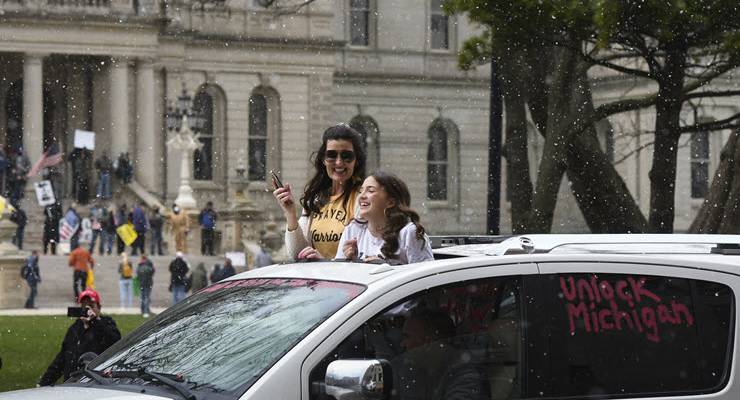
If you think Australia’s media coverage of the virus has been bad, be grateful you’re not in the US. Plus, COVID-19 responses shape electoral fortunes in South Korea, and is the curve flattening as much as we hope?
Live free and die sick
Yesterday, Crikey looked at the “death cult” thinking of Australia’s right wing commentators in the face of the public health crisis. If one needs any indication of the dangers of minimising the outbreak, look no further than the US states of Michigan and Ohio.
Yesterday, thousands of protesters filled the streets of Lansig, Michigan, demanding Democratic Governor Gretchen Whitmer ease the state’s restrictions, chanting “lock her up” and brandishing an array of flags — American, Trump-themed, confederate.
This followed weeks of right-wing media decrying the “hoax” of coronavirus and “media hysteria” in response to it. Whitmer’s strict restrictions have come under particular attack. Fox News’s bow tie-sporting, white supremacist sympathiser Tucker Carlson called the restrictions “petty authoritarianism,” accusing Whitmer of putting on a show in an effort to get the running mate spot on former vice president Joe Biden’s ticket.
Elsewhere, in Ohio, there are haunting images of around 100 unmasked protesters crowding up to the doors at Republican governor Mike DeWine’s daily coronavirus briefing.
While Trump has rebranded himself as the only one in the world who took the virus seriously enough, he’s calling on states with low numbers to reopen their economies by May 1. Of course, now that Trump’s changed his tone, Fox News commentators have had to perform skeleton-shudderingly extreme collective U-turn.
Japan extends its lockdown
Early on, it appeared Japan’s Shinzo Abe might be the first world leader to be ousted on account of his response to the virus. While he’s held on, the country’s case numbers have gone past 8500 and 136 have died so far.
Ahead of “golden week” — a streak of four public holidays in the week bridging April and May, when many people travel — he has declared a nationwide state of emergency.
It extends the conditions already in place for seven of Japan’s prefectures, allowing governors to call for the closure of businesses and restrictions on movement.
Across the Sea of Japan (or the East Sea, depending on which country you’re asking) South Korean President Moon Jae-in shows what an effective virus response can do for a governing party, winning a landslide victory in South Korea’s parliamentary elections.
Moon was criticised early on in the crisis after South Korea became the second international site of a major outbreak when members of Christian cult Shincheonji Church with the virus traveled back to their communities. The country has since reduced its daily cases down to around 40 a day (from a high of 813).
By the numbers
It appears that the sacrifices are begining to pay off. Australia continues to, slowly but surely, flatten the curve.
Covid19data.com.au reports we have had five consecutive days of fewer than 50 new cases per day:

However it’s also being argued we still need better records to properly track what’s happening to the numbers in Australia.








The “land of the freaks and home of the brainless”, don’t you just love them!
BTW. in that plague infested aircraft carrier of theirs a study was performed. It showed that the bulk of transmission was caused by young fit people with no symptoms.
Oh come on you sad Seppos, forget the weapons and placards…show ’em you mean business with some “MAGA group hugs” and a bit of “tongue kiss a stranger for Freedom” action.